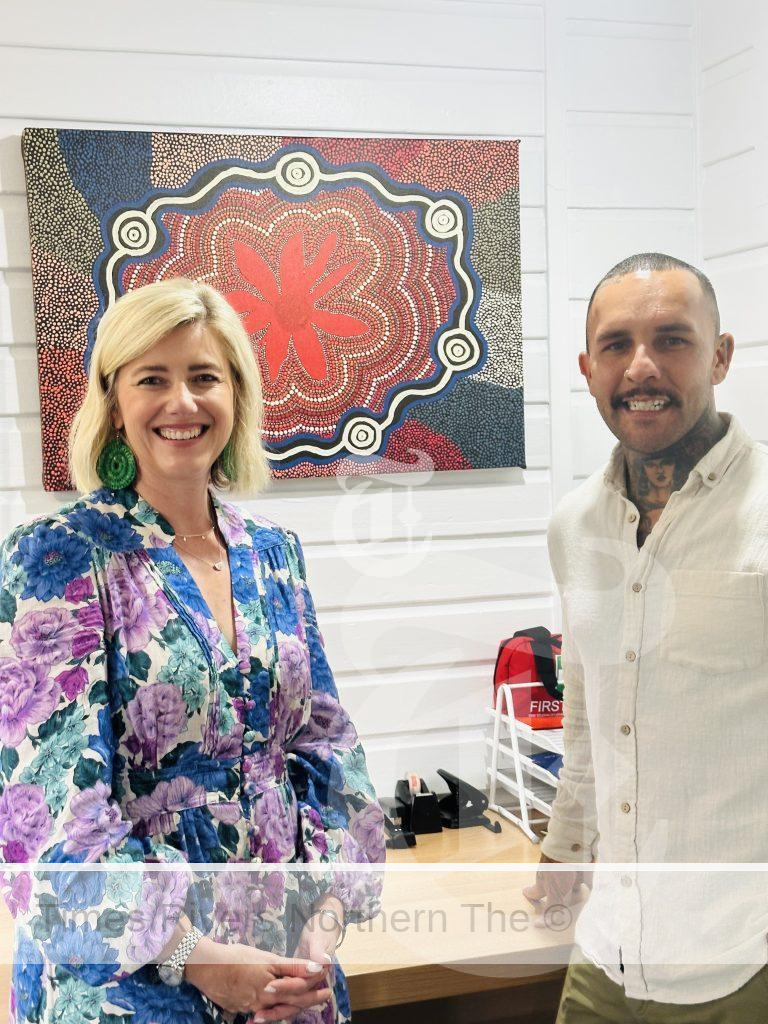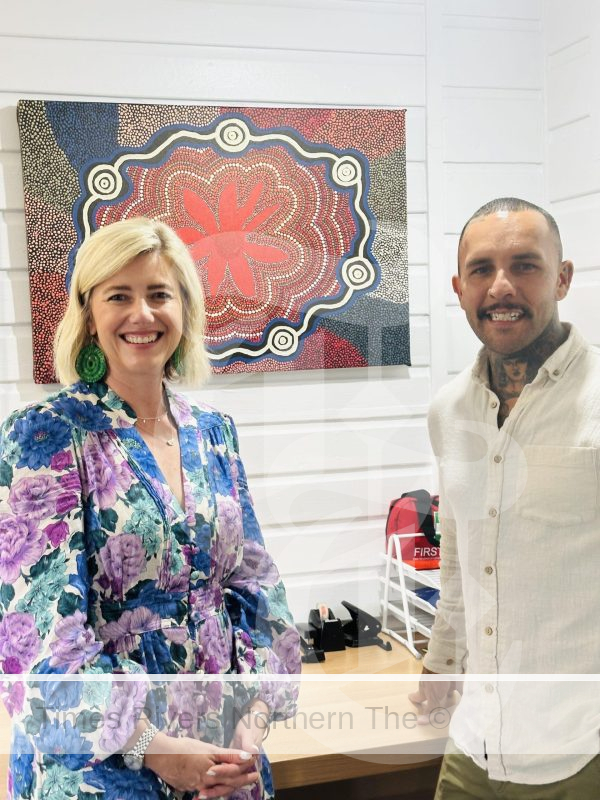Local indigenous man gets real about the trials and challenges of parenthood
By Sarah Waters
Ballina resident Kaiden Powell says the opening of Gidget House at Tresillian Lismore Family Care Centre, is a welcome addition for Northern Rivers parents who need extra support in their parenting journey.
Kaiden, 34, grew up in Orange NSW, on Wiradjuri country, home to the largest Aboriginal group in central NSW.
Over the past 17 years he has worked as an artist, counsellor and mentor to many young men in the community, where he continues to pass on the Wiradjuri culture and its strong connection to the land.
In recent years, Kaiden founded the organisation Changing the Odds, which delivers art therapy programs to individuals and organisations.
Prior to that, he was a counsellor at Namatjira Haven Drug and Alcohol Healing Centre and has toured the country as a motivational speaker, sharing his inspirational story of adversity and recovery.
During his twenties, Kaiden found himself taking on the role of a father figure to two young boys, now aged 10 and 12, when he was in a relationship with their mother.
He still considers them to be his stepchildren, although he is no longer with their mother.
“I still am involved in their lives and have maintained that relationship with them,” Kaiden said.
“I grew up with an absent dad and I think it’s important for young boys to have a father figure and a role model,” he said.
Despite, not having his dad around, Kaiden was surrounded by his four siblings, younger nieces and nephews and what he describes as the perfect mother and grandmother.
He knew by the age of 15 he wanted to be a dad, at some stage of his life, and acting as a father to his former partner’s children came naturally to him.
Two and a half years ago, Kaiden had his own child, named Yindyamarra – in Wiradjuri language, it means our way of life, which is love and respect, and going into spaces, gently and softly.
Like many new fathers, Kaiden said he was overwhelmed by the joy of having a new son.
But not long after Yindyamarra was born, unresolved feelings from his own childhood started to resurface.
“I put such high expectations on myself of what I wanted to be like as a father.
“I was looking at my own son and thinking I love him so much, then I started reflecting back on my own childhood and was thinking how come my father wasn’t the same and around … or even tried to reach out to me.”

CEO Gidget Foundation Australia Arabella Gibson and Kaiden Powell at the opening of Gidget House in Lismore.
Kaiden carried around those feelings with him, while working two jobs, running a business and navigating the ebb and flow of parenting.
He started to feel shame and guilt for feeling the way he did, especially as he saw how busy Yindyamarra’s mother was with the new baby.
Eventually he found help through SMS4dads, a free text message service which delivers advice, tips, and support to new fathers via their phones.
The information is synced directly to their baby’s stage of development, so they’re aware of what to expect and are also reminded to be aware of their own mental health.
Kaiden said it made him realise it was ok to have difficult feelings as a new dad and he could address those old wounds he had been carrying around since childhood.
SMS4dads commissioned Kaiden to create an original artwork about his journey into fatherhood.
The painting is based on the theme that no matter where you come from, you’re not alone and are able to have conversations about the many feelings that arise during fatherhood.
Kaiden said any service that offers help to new parents, such as Gidget House in Lismore, is always needed.
“Parenthood isn’t how you expect it to be.
“It’s important to have that space where we can talk about our own mental health and wellbeing, so we can be the best parents we can be.
“I’m co-parenting at the moment too, so that can have its challenges, but my focus is always on the children and maintaining positive relationships, because then everyone else benefits,” he said.
Kaiden continues to juggle fatherhood with his business Changing the Odds, while also working as a counsellor, motivational speaker and artist.
He is also a member of the Aboriginal Men’s Advisory Group.
Prior to fatherhood, he toured internationally with the National Indigenous Soccer team.
Any new parents, who need extra support, can access GP-referred, free specialist perinatal counselling sessions at Gidget House at Tresillian Lismore Family Care Centre.
For further information visit: www.gidgetfoundation.org.au
For more health news, click here.





 Tweed Shire News2 years ago
Tweed Shire News2 years ago
 Motoring News1 year ago
Motoring News1 year ago
 COVID-19 Northern Rivers News3 years ago
COVID-19 Northern Rivers News3 years ago
 COVID-19 Northern Rivers News3 years ago
COVID-19 Northern Rivers News3 years ago
 Northern Rivers Local News3 years ago
Northern Rivers Local News3 years ago
 Health News3 years ago
Health News3 years ago
 COVID-19 Northern Rivers News3 years ago
COVID-19 Northern Rivers News3 years ago
 NSW Breaking News3 years ago
NSW Breaking News3 years ago























